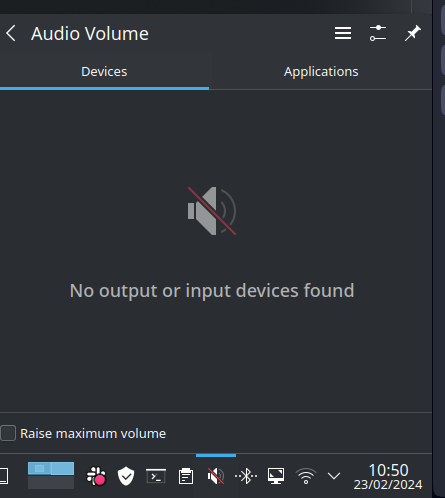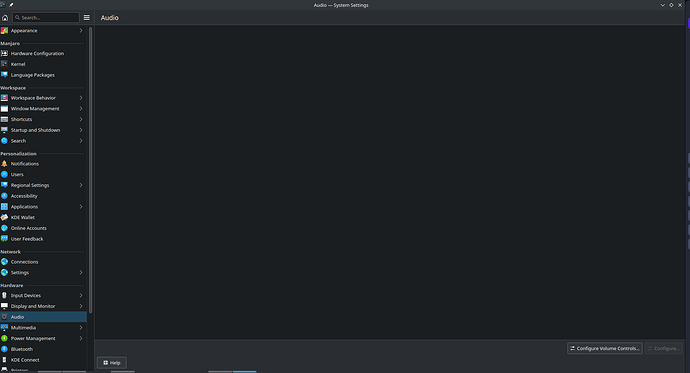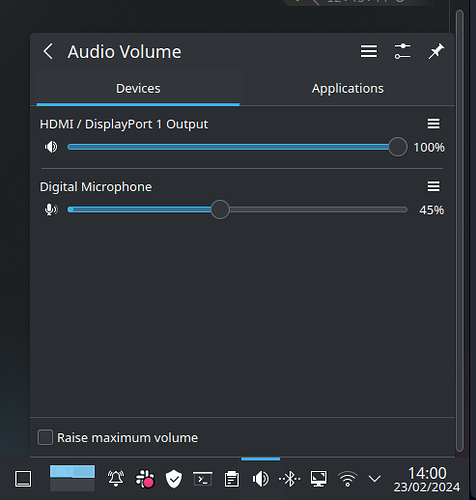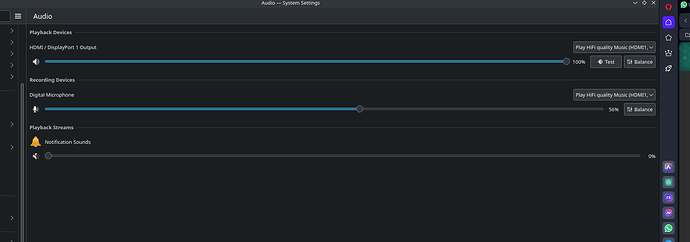My audio is not working anymore, it’s not detecting any device.

I already tried to restart, to change the kernel but it’s not working, when I try to start pulseaudio service is not working.
fev 23 10:47:21 anderson-inspiron5402 systemd[781]: Starting Sound Service...
░░ Subject: A start job for unit UNIT has begun execution
░░ Defined-By: systemd
░░ Support: https://forum.manjaro.org/c/support
░░
░░ A start job for unit UNIT has begun execution.
░░
░░ The job identifier is 246.
fev 23 10:48:51 anderson-inspiron5402 systemd[781]: pulseaudio.service: start operation timed out. Terminating.
fev 23 10:50:21 anderson-inspiron5402 systemd[781]: pulseaudio.service: State 'stop-sigterm' timed out. Killing.
fev 23 10:50:21 anderson-inspiron5402 systemd[781]: pulseaudio.service: Killing process 1142 (pulseaudio) with signal SIGKILL.
fev 23 10:51:51 anderson-inspiron5402 systemd[781]: pulseaudio.service: Processes still around after SIGKILL. Ignoring.
fev 23 10:52:42 anderson-inspiron5402 systemd[781]: pulseaudio.service: Main process exited, code=killed, status=9/KILL
░░ Subject: Unit process exited
░░ Defined-By: systemd
░░ Support: https://forum.manjaro.org/c/support
░░
░░ An ExecStart= process belonging to unit UNIT has exited.
░░
░░ The process' exit code is 'killed' and its exit status is 9.
fev 23 10:52:42 anderson-inspiron5402 systemd[781]: pulseaudio.service: Failed with result 'timeout'.
░░ Subject: Unit failed
░░ Defined-By: systemd
░░ Support: https://forum.manjaro.org/c/support
░░
░░ The unit UNIT has entered the 'failed' state with result 'timeout'.
fev 23 10:52:42 anderson-inspiron5402 systemd[781]: Failed to start Sound Service.
░░ Subject: A start job for unit UNIT has failed
░░ Defined-By: systemd
░░ Support: https://forum.manjaro.org/c/support
░░
░░ A start job for unit UNIT has finished with a failure.
░░
░░ The job identifier is 246 and the job result is failed.
fev 23 10:52:42 anderson-inspiron5402 systemd[781]: pulseaudio.service: Scheduled restart job, restart counter is at 1.
░░ Subject: Automatic restarting of a unit has been scheduled
░░ Defined-By: systemd
░░ Support: https://forum.manjaro.org/c/support
░░
░░ Automatic restarting of the unit UNIT has been scheduled, as the result for
░░ the configured Restart= setting for the unit.
fev 23 10:52:42 anderson-inspiron5402 systemd[781]: Starting Sound Service...
░░ Subject: A start job for unit UNIT has begun execution
░░ Defined-By: systemd
░░ Support: https://forum.manjaro.org/c/support
░░
░░ A start job for unit UNIT has begun execution.
░░
░░ The job identifier is 412.
fev 23 10:52:42 anderson-inspiron5402 pulseaudio[3268]: Stale PID file, overwriting.
This is my inxy -Fazy
System:
Kernel: 6.6.16-2-MANJARO arch: x86_64 bits: 64 compiler: gcc v: 13.2.1
clocksource: tsc avail: acpi_pm
parameters: BOOT_IMAGE=/@/boot/vmlinuz-6.6-x86_64
root=UUID=b1a10b11-c835-40e5-beac-bd4b100f3555 rw rootflags=subvol=@ quiet
splash udev.log_priority=3
Desktop: KDE Plasma v: 5.27.10 tk: Qt v: N/A wm: kwin_x11 dm: SDDM
Distro: Manjaro base: Arch Linux
Machine:
Type: Laptop System: Dell product: Inspiron 5402 v: N/A serial: <filter>
Chassis: type: 10 serial: <filter>
Mobo: Dell model: 0FJYHK v: A00 serial: <filter> part-nu: 0A01
uuid: 4c4c4544-0059-5010-8052-c2c04f544a33 UEFI: Dell v: 1.8.0
date: 10/01/2021
Battery:
ID-1: BAT0 charge: 44.0 Wh (100.0%) condition: 44.0/53.0 Wh (82.9%)
volts: 16.1 min: 15.0 model: BYD DELL TXD0316 type: Unknown serial: <filter>
status: full
Device-1: hidpp_battery_0 model: Logitech Wireless Mouse MX Master 3
serial: <filter> charge: 100% (should be ignored) rechargeable: yes
status: discharging
CPU:
Info: model: 11th Gen Intel Core i7-1165G7 bits: 64 type: MT MCP
arch: Tiger Lake gen: core 11 level: v4 note: check built: 2020
process: Intel 10nm family: 6 model-id: 0x8C (140) stepping: 1
microcode: 0xB4
Topology: cpus: 1x cores: 4 tpc: 2 threads: 8 smt: enabled cache:
L1: 320 KiB desc: d-4x48 KiB; i-4x32 KiB L2: 5 MiB desc: 4x1.2 MiB L3: 12 MiB
desc: 1x12 MiB
Speed (MHz): avg: 835 high: 1200 min/max: 400/4700 base/boost: 1700/1700
scaling: driver: intel_pstate governor: powersave volts: 0.6 V
ext-clock: 100 MHz cores: 1: 990 2: 400 3: 987 4: 1200 5: 1164 6: 1140
7: 400 8: 400 bogomips: 27040
Flags: avx avx2 ht lm nx pae sse sse2 sse3 sse4_1 sse4_2 ssse3 vmx
Vulnerabilities:
Type: gather_data_sampling mitigation: Microcode
Type: itlb_multihit status: Not affected
Type: l1tf status: Not affected
Type: mds status: Not affected
Type: meltdown status: Not affected
Type: mmio_stale_data status: Not affected
Type: retbleed status: Not affected
Type: spec_rstack_overflow status: Not affected
Type: spec_store_bypass mitigation: Speculative Store Bypass disabled via
prctl
Type: spectre_v1 mitigation: usercopy/swapgs barriers and __user pointer
sanitization
Type: spectre_v2 mitigation: Enhanced / Automatic IBRS, IBPB: conditional,
RSB filling, PBRSB-eIBRS: SW sequence
Type: srbds status: Not affected
Type: tsx_async_abort status: Not affected
Graphics:
Device-1: Intel TigerLake-LP GT2 [Iris Xe Graphics] vendor: Dell driver: i915
v: kernel arch: Gen-12.1 process: Intel 10nm built: 2020-21 ports:
active: HDMI-A-1,eDP-1 empty: DP-1 bus-ID: 0000:00:02.0 chip-ID: 8086:9a49
class-ID: 0300
Device-2: NVIDIA GP108M [GeForce MX330] vendor: Dell driver: nvidia
v: 545.29.06 alternate: nouveau,nvidia_drm non-free: 545.xx+ status: current
(as of 2024-02; EOL~2026-12-xx) arch: Pascal code: GP10x process: TSMC 16nm
built: 2016-2021 bus-ID: 0000:2b:00.0 chip-ID: 10de:1d16 class-ID: 0302
Device-3: Realtek Integrated_Webcam_HD driver: uvcvideo type: USB rev: 2.0
speed: 480 Mb/s lanes: 1 mode: 2.0 bus-ID: 3-6:4 chip-ID: 0bda:5538
class-ID: 0e02 serial: <filter>
Display: server: X.Org v: 21.1.11 with: Xwayland v: 23.2.4
compositor: kwin_x11 driver: X: loaded: modesetting,nvidia unloaded: nouveau
alternate: fbdev,nv,vesa dri: iris gpu: i915 display-ID: :0 screens: 1
Screen-1: 0 s-res: 3840x1080 s-dpi: 96 s-size: 1016x285mm (40.00x11.22")
s-diag: 1055mm (41.54")
Monitor-1: HDMI-A-1 mapped: HDMI-1 pos: right model: AOC 27G2G5
serial: <filter> built: 2021 res: 1920x1080 hz: 60 dpi: 82 gamma: 1.2
size: 598x336mm (23.54x13.23") diag: 686mm (27") ratio: 16:9 modes:
max: 1920x1080 min: 720x400
Monitor-2: eDP-1 pos: primary,left model: BOE Display 0x082e built: 2018
res: 1920x1080 hz: 60 dpi: 158 gamma: 1.2 size: 309x174mm (12.17x6.85")
diag: 355mm (14") ratio: 16:9 modes: 1920x1080
API: EGL v: 1.5 hw: drv: intel iris drv: nvidia platforms: device: 0
drv: nvidia device: 1 drv: iris device: 3 drv: swrast gbm: drv: kms_swrast
surfaceless: drv: nvidia x11: drv: iris inactive: wayland,device-2
API: OpenGL v: 4.6.0 compat-v: 4.5 vendor: intel mesa v: 23.3.5-manjaro1.1
glx-v: 1.4 direct-render: yes renderer: Mesa Intel Xe Graphics (TGL GT2)
device-ID: 8086:9a49 memory: 15 GiB unified: yes
API: Vulkan v: 1.3.276 layers: 2 device: 0 type: discrete-gpu
name: NVIDIA GeForce MX330 driver: nvidia v: 545.29.06 device-ID: 10de:1d16
surfaces: xcb,xlib device: 1 type: integrated-gpu name: Intel Xe Graphics
(TGL GT2) driver: mesa intel v: 23.3.5-manjaro1.1 device-ID: 8086:9a49
surfaces: xcb,xlib
Audio:
Device-1: Intel Tiger Lake-LP Smart Sound Audio vendor: Dell
driver: sof-audio-pci-intel-tgl
alternate: snd_hda_intel,snd_sof_pci_intel_tgl bus-ID: 0000:00:1f.3
chip-ID: 8086:a0c8 class-ID: 0401
API: ALSA v: k6.6.16-2-MANJARO status: kernel-api with: aoss
type: oss-emulator tools: alsactl,alsamixer,amixer
Server-1: JACK v: 1.9.22 status: off tools: N/A
Server-2: PipeWire v: 1.0.3 status: off with: pipewire-media-session
status: off tools: pw-cli
Server-3: PulseAudio v: 17.0 status: active (root, process)
with: pulseaudio-alsa type: plugin tools: pacat,pactl
Network:
Device-1: Intel Wi-Fi 6 AX201 driver: iwlwifi v: kernel bus-ID: 0000:00:14.3
chip-ID: 8086:a0f0 class-ID: 0280
IF: wlp0s20f3 state: up mac: <filter>
IF-ID-1: virbr0 state: down mac: <filter>
Info: services: NetworkManager,wpa_supplicant
Bluetooth:
Device-1: Intel Bluetooth 9460/9560 Jefferson Peak (JfP) driver: btusb v: 0.8
type: USB rev: 2.0 speed: 12 Mb/s lanes: 1 mode: 1.1 bus-ID: 3-10:5
chip-ID: 8087:0aaa class-ID: e001
Report: rfkill ID: hci0 rfk-id: 0 state: up address: see --recommends
RAID:
Hardware-1: Intel Volume Management Device NVMe RAID Controller driver: vmd
v: 0.6 port: N/A bus-ID: 0000:00:0e.0 chip-ID: 8086:9a0b rev: class-ID: 0104
Drives:
Local Storage: total: 476.94 GiB used: 292.56 GiB (61.3%)
ID-1: /dev/nvme0n1 maj-min: 259:0 vendor: A-Data
model: IM2P33F3A NVMe 512GB size: 476.94 GiB block-size: physical: 512 B
logical: 512 B speed: 31.6 Gb/s lanes: 4 tech: SSD serial: <filter>
fw-rev: 92103061 temp: 32.9 C scheme: GPT
SMART: yes health: PASSED on: 167d 2h cycles: 1,129
read-units: 171,795,818 [87.9 TB] written-units: 50,278,025 [25.7 TB]
Partition:
ID-1: / raw-size: 120 GiB size: 120 GiB (100.00%) used: 72.21 GiB (60.2%)
fs: btrfs block-size: 4096 B dev: /dev/nvme0n1p5 maj-min: 259:4
ID-2: /boot/efi raw-size: 512 MiB size: 511 MiB (99.80%)
used: 596 KiB (0.1%) fs: vfat block-size: 512 B dev: /dev/nvme0n1p1
maj-min: 259:1
ID-3: /home raw-size: 348.44 GiB size: 348.44 GiB (100.00%)
used: 220.34 GiB (63.2%) fs: btrfs block-size: 4096 B dev: /dev/nvme0n1p4
maj-min: 259:3
ID-4: /var/log raw-size: 120 GiB size: 120 GiB (100.00%)
used: 72.21 GiB (60.2%) fs: btrfs block-size: 4096 B dev: /dev/nvme0n1p5
maj-min: 259:4
Swap:
Kernel: swappiness: 60 (default) cache-pressure: 100 (default) zswap: yes
compressor: zstd max-pool: 20%
ID-1: swap-1 type: partition size: 8 GiB used: 9.5 MiB (0.1%) priority: -2
dev: /dev/nvme0n1p2 maj-min: 259:2
Sensors:
System Temperatures: cpu: 50.0 C mobo: 48.0 C sodimm: SODIMM C
Fan Speeds (rpm): cpu: 2905 fan-1: 2904
Info:
Memory: total: 16 GiB available: 15.36 GiB used: 4.42 GiB (28.8%)
igpu: 64 MiB
Processes: 311 Power: uptime: 7m states: freeze,mem,disk suspend: s2idle
wakeups: 0 hibernate: platform avail: shutdown, reboot, suspend, test_resume
image: 6.13 GiB services: org_kde_powerdevil, power-profiles-daemon,
upowerd Init: systemd v: 255 default: graphical tool: systemctl
Packages: 1630 pm: dpkg pkgs: 0 tools: apt,apt-get pm: pacman pkgs: 1621
libs: 429 tools: pamac pm: flatpak pkgs: 9 Compilers: clang: 16.0.6
gcc: 13.2.1 Shell: Sudo (sudo) v: 1.9.15p5 default: Bash v: 5.2.26
running-in: konsole inxi: 3.3.33
Someone could help me please?


